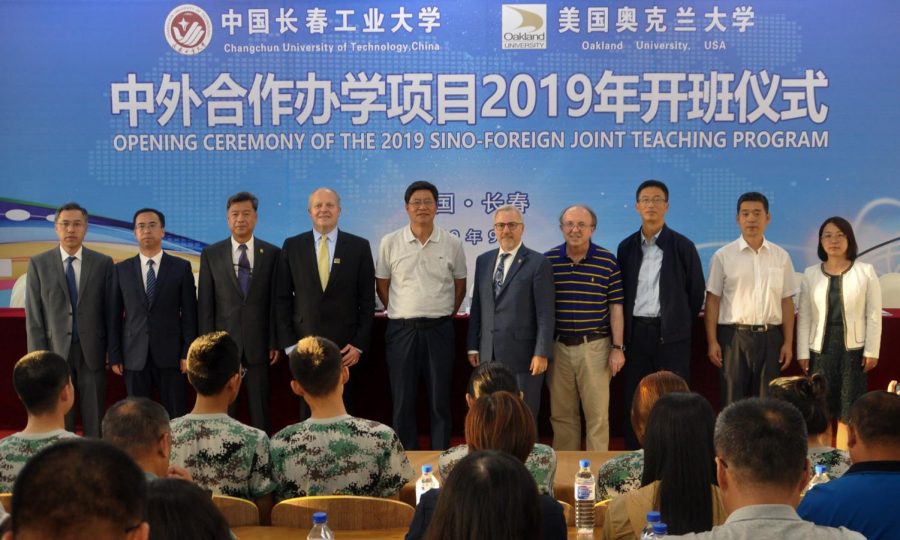SECS expands partnerships with Chinese universities
Courtesy of Oakland University
The OU delegation at the Opening Ceremony of the 2019 Sino-Foreign (CCUT-OU 2+2) Joint Teaching Program.
After traveling to China from Sept. 8-13 to strengthen partnerships with three STEM-focused universities, leaders of the Oakland University School of Engineering and Computer Science (SECS) are expecting an increase in the number of Chinese exchange students attending OU.
SECS Dean Louay Chamra; Lianxiang Yang, distinguished professor of mechanical engineering; and Gary Barber, professor of mechanical engineering — as well as James Lentini, provost and senior vice president for Academic Affairs — took a trip to China to sign new agreements to expand partnerships with the Changchun University of Technology (CCUT), Zhengzhou University of Light Industry (ZZULI) and Beijing Information Science & Technology University (BISTU).
The new agreements came after being expanded last year when the SECS leaders and OU President Ora Hirsch Pescovitz met with the leaders of the universities in China.
While at CCUT, OU signed a new Agreement for American Semester Abroad Program that will host up to 35 undergraduate or graduate students. With ZZULI, OU signed a Memorandum of Understanding for a new joint institute to implement Engineering and Computer Science programs at ZZULI sponsored by the Chinese Ministry of Education.
Leaders visited BISTU to discuss existing programs and also share ideas about new joint programs. Two-hundred students and parents also attended an opening ceremony for the OU-CCUT international program to learn more from a panel of OU and CCUT professors and administrators.
For international students who are part of the exchange, the programs consist of either a three-week summer camp with hands-on experience in engineering and computer science or a one-year exchange where students then finish their degrees in China. Chamra said a top benefit of the exchange program is students pay OU tuition when attending.
OU’s partnerships with China bring in around 40-50 students each year. At least 30-40% of these exchange students pursue graduate degrees at OU, according to Chamra.
OU is also establishing a graduate student exchange program, where students take classes in China for one year then transfer to OU for another year, earning them degrees from both institutions.
Currently, the SECS has about 300 students from China out of the 3,600 total students. Many other SECS students agree the partnerships will offer exchange students a beneficial opportunity.
Savonna Sou, junior, said the program is a great step for future STEM workers to heighten their technical skills through learning.
“The learning techniques of engineering over there translate into ours,” he said. “We’re just getting a variety of different types of engineering advances, even learning about history about [China’s] advancements, and also taking part in how we can change our engineering to either better theirs and then apply it to ours, or just better ours by using their advances.”
David Huang, sophomore, said even other SECS students can benefit by building friendships with exchange students.
“China is currently the world’s largest manufacturer, and having these partnerships with Chinese universities will allow students here to potentially network with Chinese students who will get to work in these manufacturing firms,” Huang said.
The OU SECS offers a unique program for students that focuses mainly on practice and theory with much out-of-the-classroom experience. According to Chamra, 95% of students find jobs after graduating, with an average annual salary of around $70,000.
With the expanding partnerships, Chamra said other SECS students have the opportunity to learn about cultures other than their own.
“Everybody knows about the tensions between our government and the Chinese government, and I really think the strength of these agreements and bringing Chinese students to our campus make us better people by understanding each other, talking to each other — and that cultural difference is very important to talking one-one-one — and that’s the power of having a diverse student body at Oakland University.”







